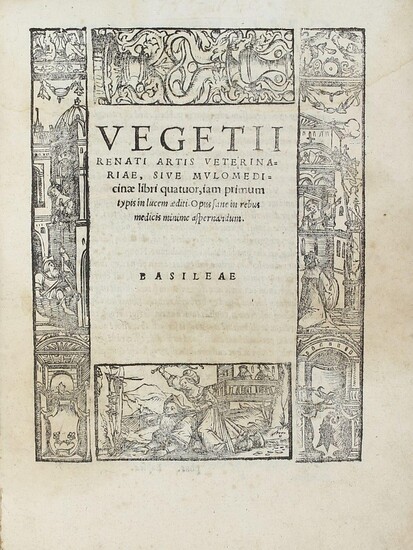Artis veterinariae, sive mulomedicinae libri quatuor V, jam primum typis in lucem aediti. Opus sane in rebus medicis minime aspernandum.
By VEGETIUS RENATUS, Publius
4to (200 x 145 mm). [8] 72 ff. Signatures: [a]-b4 A-S4, 80 leaves. Italic letter with Roman headings. Title within a woodcut border made up of 4 blocks; woodcut initials. [Colophon:] Basileae. Anno. M. D. XXVIII. Excudebat Joannes Faber Emmeus Juliacensis. 18th-century calf-backed boards (spine a bit damaged by worming), marbled pastedowns. Some gatherings of text unevenly browned, lower margin a bit stained towards end. ---- Schweiger II, 1123-24; VDI6 V468; Adams V341; NLM/Durling 4563; Wellcome 6524. - FIRST EDITION of the first published monograph on veterinary medicine. In addition to practical advice Vegatius Renatus stressed the economic benefits of good veterinary practice. "A German translation was published in 1532, and two further Latin editions in 1574 and 1781, respectively. The first work of the Christian era entirely devoted to veterinary medicine and the first monograph on the subject to be printed. Publius Vegetius Renatus was a Roman man of letters who flourished about 450-500 AD. He is not to confused with Flavius Vegetius Renatus, a soldier and author of the famous military textbook. Nor was he a horse trader and farrier as is often stated. Publius Vegetius had travelled widely and set out to restore veterinary medicine to the position it held in ancient Greece and to counter the public indifference to the profession. He stresses the economic benefits of veterinary medicine and says that good hygiene is important as it is better to preserve the health of horses and cattle than to try to restore it. He says that he has consulted contemporary veterinarians as well as physicians. Frederick Smith gives a full analysis of the text in his unpublished The history of veterinary medicine (1900, pp. 20-30). Having said in his section on Vegetius that his work, which he calls 'epoch making', was 'the first veterinary work ever printed', he later corrects this in a footnote (p. 42), saying that veterinary science was treated by Ruffus in a book printed at Venice in 1492 and also that Moulé refers to 14th and 15th-century works printed as early as 1486 and others in 1494 and 1495. None-the-less it seems safe to say that this is the first printed monograph on veterinary science. Frederick Smith, The history of veterinary medicine (1900), unpublished proof, Cambridge University Library, Syn 4.91.36." (R. Gaskell, Books from the Library of Walter Pagel, Pt. I, 127).- Visit our website to see more images!
Published by: Johann Faber of Emmich, Basel, 1528
Vendor: Milestones of Science Books
Buy Now on
By VEGETIUS RENATUS, Publius
4to (200 x 145 mm). [8] 72 ff. Signatures: [a]-b4 A-S4, 80 leaves. Italic letter with Roman headings. Title within a woodcut border made up of 4 blocks; woodcut initials. [Colophon:] Basileae. Anno. M. D. XXVIII. Excudebat Joannes Faber Emmeus Juliacensis. 18th-century calf-backed boards (spine a bit damaged by worming), marbled pastedowns. Some gatherings of text unevenly browned, lower margin a bit stained towards end. ---- Schweiger II, 1123-24; VDI6 V468; Adams V341; NLM/Durling 4563; Wellcome 6524. - FIRST EDITION of the first published monograph on veterinary medicine. In addition to practical advice Vegatius Renatus stressed the economic benefits of good veterinary practice. "A German translation was published in 1532, and two further Latin editions in 1574 and 1781, respectively. The first work of the Christian era entirely devoted to veterinary medicine and the first monograph on the subject to be printed. Publius Vegetius Renatus was a Roman man of letters who flourished about 450-500 AD. He is not to confused with Flavius Vegetius Renatus, a soldier and author of the famous military textbook. Nor was he a horse trader and farrier as is often stated. Publius Vegetius had travelled widely and set out to restore veterinary medicine to the position it held in ancient Greece and to counter the public indifference to the profession. He stresses the economic benefits of veterinary medicine and says that good hygiene is important as it is better to preserve the health of horses and cattle than to try to restore it. He says that he has consulted contemporary veterinarians as well as physicians. Frederick Smith gives a full analysis of the text in his unpublished The history of veterinary medicine (1900, pp. 20-30). Having said in his section on Vegetius that his work, which he calls 'epoch making', was 'the first veterinary work ever printed', he later corrects this in a footnote (p. 42), saying that veterinary science was treated by Ruffus in a book printed at Venice in 1492 and also that Moulé refers to 14th and 15th-century works printed as early as 1486 and others in 1494 and 1495. None-the-less it seems safe to say that this is the first printed monograph on veterinary science. Frederick Smith, The history of veterinary medicine (1900), unpublished proof, Cambridge University Library, Syn 4.91.36." (R. Gaskell, Books from the Library of Walter Pagel, Pt. I, 127).- Visit our website to see more images!
Published by: Johann Faber of Emmich, Basel, 1528
Vendor: Milestones of Science Books



